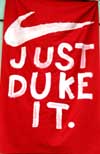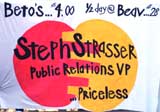Candidates walk thin line of infringement
“Just do it,” because “there’s no wrong way to [campaign for office].” In fact, any way is “priceless.”
Nike, Reese’s and MasterCard are all represented along campus and city walkways.
Some candidates running for the Associated Students of Utah State University Executive Council illegally campaign with altered versions of slogans and logos that belong to various international businesses. The fact is: They don’t know what they’re doing is illegal.
Stephanie Strasser, who is running for public relations vice president, said she didn’t know she might be violating MasterCard trademark rights.
Justin Rees, a candidate for Business senator, is playing off of Reese’s peanut butter cups for his campaign. He said he took copyright and trademarks into consideration in creating his signs, so he wouldn’t do something wrong.
“It was definitely a worry,” he said.
Rees explained he figured it was OK to use the product in his campaign if he changed it somewhat. He said he used a more reddish color, instead of orange, for the package. He used his last name, which is only part of the product’s name.
“I didn’t copy it exactly,” he said.
But Penny Byrne, a professor of media law, pointed out that use of almost anything resembling a company’s product could constitute infringement.
“If the representation is so obvious to call the product to mind immediately, a court could find an accusation,” she said.
Hershey Foods Corporation, which makes Reese’s, prohibits using its characters without permission.
“Any unauthorized use of the images may violate copyright laws, trademark laws, the laws of privacy and publicity, and communications regulations and statutes,” according to www.hersheys.com.
MasterCard reserves outside use of its brand mark to accepting merchants, co-brand partners and their communications resources. The mark “must never be cropped, disassembled or altered in any way,” according to www.mastercard.com.
Similarly, Nike does not allow use of its logo or slogan unless it researches the requesting party, then gives written permission, like a contract. And world headquarters representative Irene says that’s something corporate officials rarely offer. In fact, most calls about copyright or trademarks are just directed to a machine explaining that the company does not allow any outside use of its images.
“Normally [we only permit] events that we’re sponsoring,” she said.
Nike could take legal action against any other parties using its likeness, including a school, Irene said. The company pays certain employees to find the perpetrators.
However, a lawsuit is unlikely.
“There’s so much infringement [going on in the country],” she said.
Duke Di Stefano, who is running for president, said he contacted a Nike representative, who told him it was OK to use the symbol. He explained he doesn’t want to do anything wrong, so he plans to call the company again to find out if he was given incorrect information and needs to make his request in writing.
Milo Andrus, a candidate for Agriculture senator, is using a logo for the Nestle drink Milo in his campaign. He also said he talked to a company representative who told him it would probably be OK to use the image.
Some people aren’t bothered by the idea of infringement on campus or don’t know it’s happening.
Kathy Wickersham, a doctoral student studying psychology, said she didn’t know the campaigning is illegal. Regardless, “it seems so small-potatoes,” she said.
If the campaigns were part of a large-scale political election, things might be different, Wickersham explained.
Strasser said candidates have borrowed logos in the past and will likely do so in the future.
Byrne pointed out, “The fact is: It’s unethical.” On top of that, “It’s a property right. The legal issues are very clear.”
Students like Stephen Hetzel, a sophomore studying business information systems, argue a different point.
“I think it’s a lack of creativity,” he said.
But Strasser said a popular, recognizable image “makes for a catchy slogan.”
Likewise, Rees said he felt using a familiar idea would be a creative way to make people remember his name.
The only thing Decker Smith, a senior in education, remembers when he sees a sign sporting a popular logo is the product the logo normally advertises.
“It makes me think of the company,” he said.
A Nike swoosh featured on campus could confuse a person into thinking someone is selling shoes or sunglasses, not his candidacy, Smith explained.
For Rees, candidacy is something that should be guided by this year’s ASUSU officials. He said he wishes they had included copyright and trademark laws in the election rules.
Camey Hatch, ASUSU Public Relations vice president, said the organization’s election bylaws state that “copyright and any such usage is the responsibility of the candidate. USU, ASUSU or any official organization thereof claims no responsibility for the illegal use of copyright by candidates.”
ASUSU will not penalize candidates for this kind of infringement, Hatch continued.
“If any action is taken, it would legally have to come from the organization whose trademark they used,” she said.
–amarie@cc.usu.edu, mmackay@cc.usu.edu

Duke Di Stefano’s banner depicts the Nike logo.

Justin Rees’ banner depicts the Reese’s logo.

Stephanie Strausser’s banner depicts the Master Card logo. (Photos by John Zsiray)

